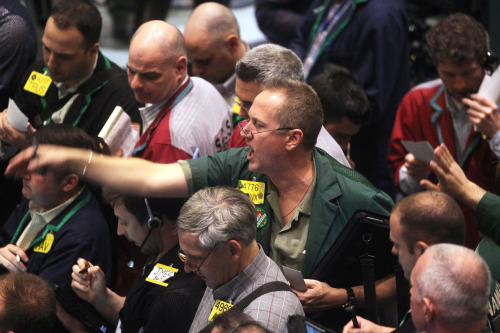NEW YORK (AP) ― The price of oil rose to a 30-month high on Thursday as fighters loyal to Moammar Gadhafi pushed back rebels from key areas in eastern Libya.
Benchmark West Texas Intermediate crude rose $2.45, more than 2 percent, to settle at $106.72 a barrel on the New York Mercantile Exchange. At one point it hit $106.83, the highest it’s been since September, 2008. In London, Brent crude rose $2.25 to settle at $117.20 per barrel.
Battles between Gadhafi’s troops and rebels have seesawed back and forth in Libyan ports and towns since mid-February, with the price of oil rising more than $20 a barrel since then. Energy consultants Cameron Hanover said traders are beginning to view the Libya uprising as a standoff for now. ‘Without control of the air, Gadhafi’s troops have been unable to hammer home their gains. And, without strong and well-trained ground forces, the rebels seem incapable of holding onto their gains. Optimism that Libyan oil might return to the market, seen earlier this week, was dashed.”
Libya’s oil exports, which went mainly to Europe, are shut down.
The rebels have said they plan to start shipping oil again, although how soon that could happen is unclear. Libya exported only about 1.6 million barrels of oil a day, or 2 percent of global consumption, but energy traders worry that unrest will spread across the region to disrupt shipments from OPEC countries like Saudi Arabia and Iran.
 |
Traders work in the crude oil options pit on the floor of the New York Mercantile Exchange on Thursday in New York City. (AFP-Yonhap News) |
The Saudis are the biggest oil producers in the world, supplying about 8.4 million barrels a day. Iran produces more than 4 million barrels a day. Anti-government protests in those countries so far have been limited, although unrest continues in Syria, Bahrain and Yemen.
Meanwhile the Saudis are making good on a promise to make up for the deficit of Libyan oil. “Saudi Arabia is beginning to supply European oil companies with crude oil to help alleviate the shortfall from Libya,” said Addison Armstrong, senior director of market research at Tradition Energy. “Saudi Arabian Oil Co. has sold three shipments of light, sweet crude for March and April delivery: two to Austrian oil company OMV AG and one to BP.”
The Energy Department’s Energy Information Administration released its weekly report on natural gas supplies on Thursday. It showed that the United States’ abundant reserves grew by 12 billion cubic feet from the week before, to 1.624 trillion cubic feet. That is 4.4 percent above the five-year average.
“Shale plays have fundamentally altered the amount of domestic supply available, leading to large weekly injections,” said energy analyst Stephen Schork, who writes the daily Schork Report newsletter.
The EIA estimates that the country has 827 trillion cubic feet of natural gas in shale formations. In all, EIA estimates the U.S. has 2,552 trillion cubic feet of potential natural gas resources, enough to satisfy the nation’s annual demand for 110 years. The agency expects that to rise in coming years as more shale resources are discovered.
Natural gas contracts rose 3.4 cents to settle at $4.389 per 1,000 cubic feet. In other Nymex trading, heating oil added 5.91 cents to settle at $3.1125 per gallon, and gasoline futures gained 5.04 cents to settle at $3.1077 per gallon.








